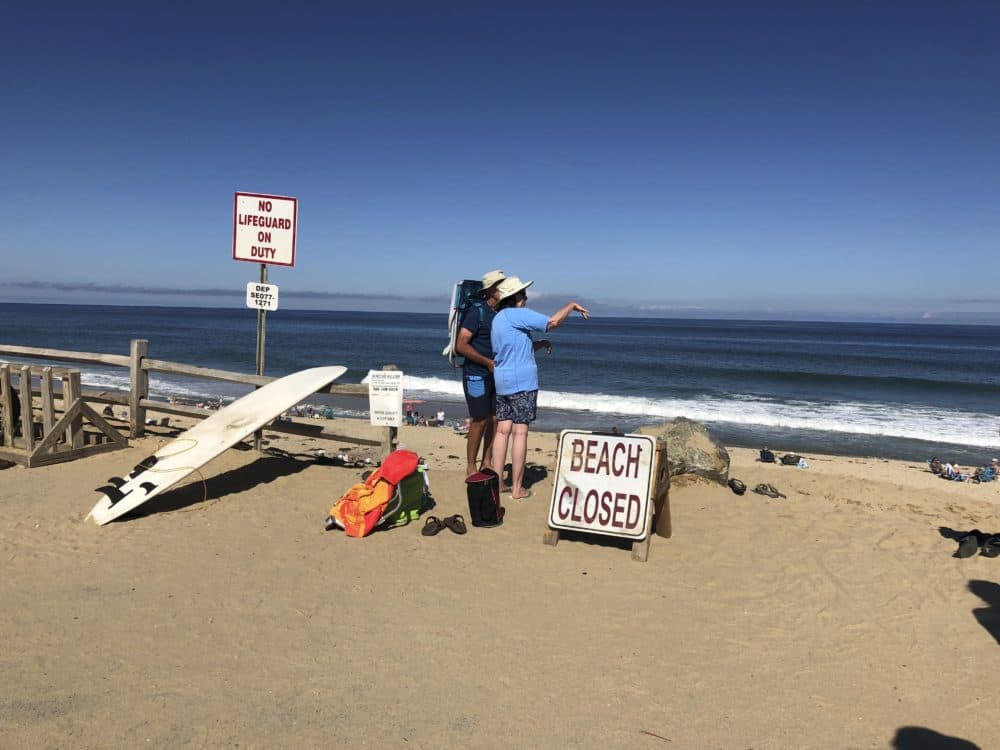Advertisement
Researcher On What Could Be Behind Massachusetts' 1st Shark Attack Death Since 1936

A 26-year-old man died Saturday in Massachusetts after he was attacked by a shark while boogie boarding off the coast of Cape Cod.
It's the first shark attack death in Massachusetts since 1936, and the second shark attack in about a month in the area — a 61-year-old man was bitten on Aug. 15, but survived. There have also been numerous shark sightings.
Here & Now's Jeremy Hobson learns more about some of the factors that might be behind the attack with James Sulikowski (@SulikowskiLab), a researcher and professor at the University of New England who specializes in sharks.
Interview Highlights
On what might be behind the deadly shark attack
"I think if you just kind of break it down and look at what's happening kind of globally, there are a lot of people in the water. And when you have a lot of people in the water, that increases the chance of interacting with a shark.
"There's lots of a food source: A major increase in seals. We've also seen a rebound of white sharks in the region as well, and the Cape is vacation haven, and so there are a lot of people in the water, and now we've kind of got all this in the mix together, and I think that's what we're seeing, is a combination of all those factors."
"Most people think, 'Wow, the populations are exploding.' They're still about 30 percent below where they were in the 1960s."
James Sulikowski, on great white sharks
On those who say it's time to start culling seals
"I think that, if you look at the ecosystem as a whole, this is what sharks do: They're apex predators, and they're here to sort of control their prey. When we get something out of balance, like it is now, sometimes you do have to take additional steps, and I think this is on the table and we'll see where it leads. But I'm sure that the right decisions will be made by those management authorities.
"I think that we need some more research for sure to see how that would impact the fishery, how that would impact people, how that would impact the sharks. We need to strike a balance, and most people would agree that things are not in balance, and that's a lot of what's going on here. So, would a cull help? I'm sure there's some for, some against. Me personally, I think that things are out of balance and there needs to be some change."
On whether great white sharks are still endangered
"They still are. Most people think, 'Wow, the populations are exploding.' They're still about 30 percent below where they were in the 1960s, when there was all these major culls in the '60s and '70s. So they're still below. They are rebounding, which is good, but again, their role really is to keep other prey down within the ecosystem, and that their populations are low. Seals are going to increase and other things are going to increase, and things will stay out of balance."
"The first thing is to be diligent. Any time you have this type of interaction with a shark, whether it's survival or a fatality, it's a terrible thing, and I think that gets us afraid to be in the water."
James Sulikowski, on steps people can take in response to the attack
On what people should do if they're going to be swimming at beaches where there have been shark sightings
"The first thing is to be diligent. Any time you have this type of interaction with a shark, whether it's survival or a fatality, it's a terrible thing, and I think that gets us afraid to be in the water. I think as long as we're diligent, and we heed the warnings of the lifeguards and all the patrols that go on, [they are] really good at keeping people informed — there's apps out there now — to be diligent of what's going on. Are there seals around? Are there warnings up? And then, when do you go in the water? Dawn and dusk are bad times, those are when sharks are really active.
"This is just in general terms. If you want to specify down to the Cape, the big thing is to be diligent. Sharks are patrolling, the white sharks are visual predators, they're looking for things. To be cognizant of where you are at any given time, I think is an important factor to think about, and just understand that the more people that are in the water, the more chances there will be an interaction with a shark or some other marine organism. It's like anything else that you do — the more times you go ice skating, [there are] more chances you're going to fall."
This segment aired on September 17, 2018.